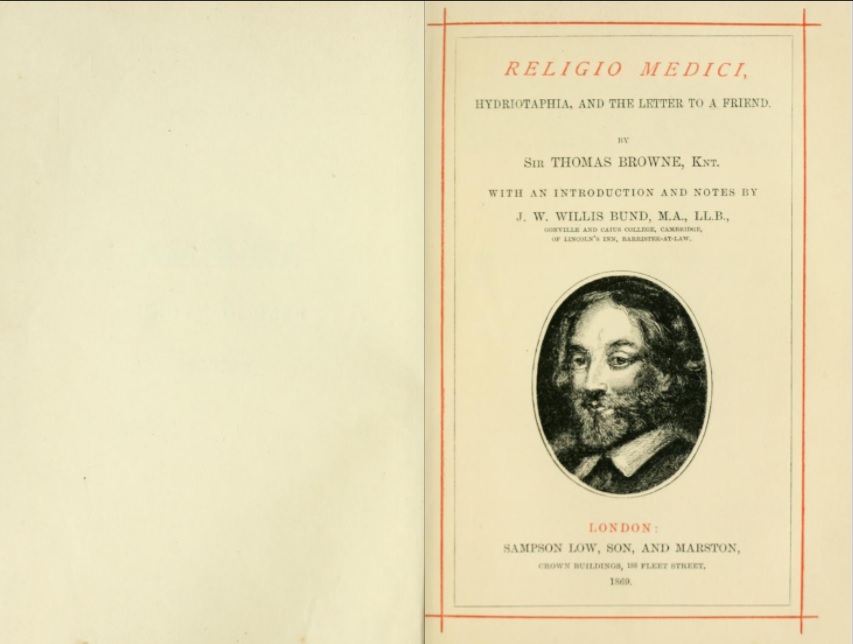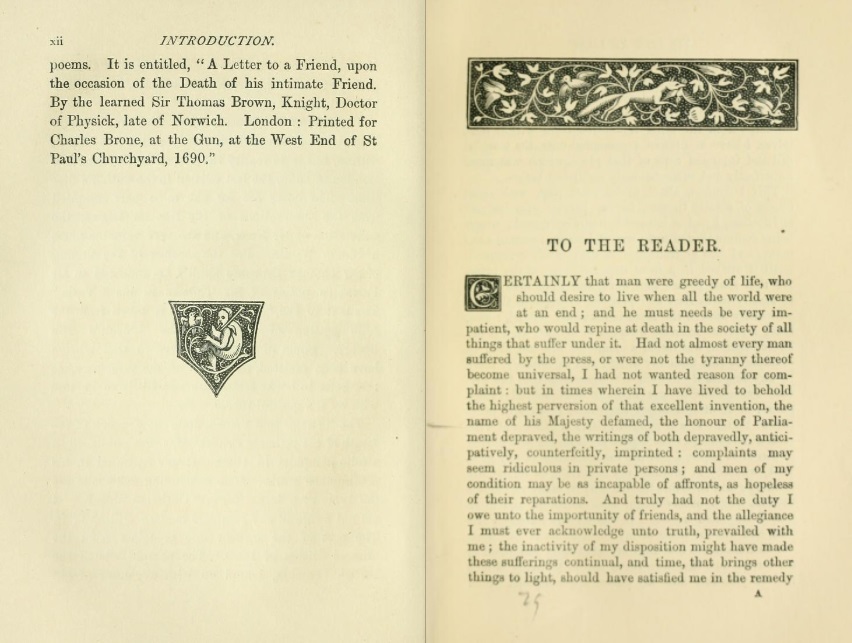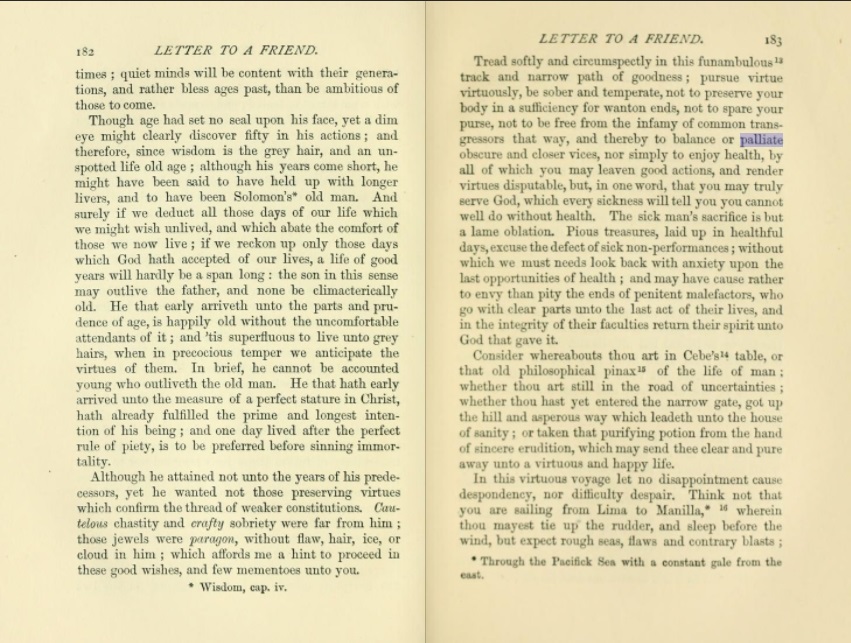References to Sir Thomas Browne in The Secret Scripture (2008)
[ Source: Collated in the Kindle edition; accessed 05.06.2017. See also images of the edition of Religio Medici cited by Roseanne McNulty in the text - as infra. ]
| 1] [...] he [her father] loved to read the sermons of preachers long gone, because, he said, he could imagine sermons fresh for some vanished Sunday, and the words new in the mouths of the preachers. His own father had been a preacher. My father was a passionate man, I might almost say celestial-minded Presbyterian man, which was not a particularly fashionable quality in Sligo. The Sermons of John Donne he prized above all, but his veritable gospel was Religio Medici by Sir Thomas Browne, a book I still possess in all the flotsam and ruckus of my life, in a little battered volume. I have it here before me on my bed, with his name in black ink inside, Joe Clear, and the date 1888, and the town Southampton, for in his extreme youth he had been a sailor, sailing into every port of Christendom before he was seventeen. (The Secret Scripture, Faber & Faber 2008, p.6; do., in Kindle, loc. 13.) |
|
|
3] ‘I can’t see how you want all them books, missus, since you have no spectacles to read them.’ |
|
| 5] [...] Dr Grene lifted from the tale my father’s od copy of Religio Medici and looked at it idly enough. I was surprised when my father died to see that the book was printed in [97] 1867, although I knew he had it always for many years. His name, and the place Southampton, and the date 1888 were of course pencilled onto the flyleaf, but still I hoped maybe the book had been ut into his youthful hands by the hands of his own father, my grandfather a person of course hom I never met. It might have been. So that when I held it in my hands, there was as it were a history of hands surrounding the little volume, the hands of my own people. Because a lone person takes great comfort from her people, in the watches of the night, even the memory of them. Because I knew the little book so well, I could guess that Dr. Grene was looking at. It was the picture of Sir Thomas Browne, with a beard. Perhaps as he looked at that beard, a very fierce jutting object in a round engraving, he may suddenly have been regretting the loss of his own. Sampson, Low, Son, and Marston were the printers. The Son was beautiful. The son of Sampson Low. Who was he, who was he? Did he labour under the whip of his father, or was he treated with gentleness and respect? J. W. Willis Bund supplied the notes. Names, names, all passed away, forgotten, mere birsong in the bushes of things. If J. W. Willis Bund can pass away forgotten, how much easier for me? We share in that at least. Son. As little I know about my own son. The son of Roseanne Clear. ‘An old book,’ he said. ‘Yes.’ ‘Whose name is that, Mrs McNulty, Joe Clear?’ Dr Grene now had a perplexed look on his face, a very deep thinking look, like a young boyy figuring out an arithmetic problem. If he had had a pencil he might have licked the head. He had shaved his beard and ws no long hiding his face, so I felt suddenly I owed him something. ‘My father,’ I said. ‘He was an educated man then?’ ‘He was indeed. He was a minister’s son. From Collooney.’ ‘Collooney,’ he said. ‘Collooney suffered so in the troubles in the twenties,’ he said. ‘I am glad somehow that one time there was a man there that read the Religio Medici.’ The way he said the last two words slowly I knew he had never encountered the book before. Dr Grene opened the book further, passing the introduction, and hunting mildly for the beginning of the book, as a person does. ‘“To the reader. Certainly that man were greedy of life, who should desire to live when all the world were at an end ...”’ Dr Grene gave a strange little laugh, not a true laugh at all, but a sort of miniature cry. Then he laid the book back where he had found it. ‘I see,’ he said, though I had said nothing. Perhaps he was talking to the old bearded face in the book, or to the book itself. Seventy-six, Thomas Browne was when he died, a youngster compared to me. He died on his birthday, as it sometimes happens, if rarely. I suppose Dr Grene is about sixty or so. I had never seen him quite so solemn as this day. (pp.98-99.) |
|
|
7] [Enaes McNulty speaks:] ‘[...] And I wanted to say, and not meaning anything by it, but you are also the most beautiful-looking person I ever saw, you and she both.’ |
|
| 9] Yesterday afternoon coming in early and weary, I went rather fearlessly I thought to Bet’s rooom. I think I may have been moved beyond the stage of self-recrimination and guilt. [...; 253] An adequate, traitorous, unloving man? A presence oddly necessary, even with a floor and ceiling between? I didn’t know. Even as Bet I didn’t know Bet. But just for a few minutes also I had something of her strength, her niceness, her integrity. What a wonderful feeling. My eye fell on her choice library of rose books, and I took up one up and started to read. I have to say it was very interesting, even poetic. [...] It was as if I were reading a letter from her, or was privileged to enter a subject that probably lined her mind like wallpaper. Rosa Gallica, a plain little rose like the one you see carved on medieval buildings as Rose Mundi, was the first. The late roses are huge tea roses that look in gardens like dancers’ bottoms in frilly knickers. What creatures we are, bringing a simple bloom to that over the centuries, and turning those mangy scavanging animals at the edge of our ancent camp fires into Borzois and poodles. The thing itself, the first thing, will never do us alone, we must be elaborating, improving, poeticising. ‘To palliate the shortness of our lives,’ I suppose as Thomas Browne wrote in the book that Roseanne has given me to give to her son. Between Religio Medici and the Royal Horticulturall Society’s Roses have I pitched a tent of sorts. And that Bet needed and wanted to know all these things about roses suddenly filled me with happiness, and pride. [...] That was not only the best day I have had since she died, but one of the best days of my life. It was as if she had dipped something in her essence down from heaven and helped me. I was so bloody grateful to her. Oh, and I forgot to say (but to whom am I saying it?) that while putting Roseanne’s book carefully aside, so I could concentrate on Bet’s volumes, a letter almost fell out of it. It was a very curious letter, in that the envelope seemed not to have [254] been opened, unless the damp of her room had somehow resealed it. [...] (pp.253-54. |
| [End] |
| Textual images |
| Religio Medici (London: Sampson Low 1869), with notes by J. W. Willis Bund [Internet Archive - online - ] |
| Note that the edition does not include the “Christian Morals” an epigraph from which is prefaced to The Secret Scripture - and there correctly attributed to that text - has been taken. It follows that the epigraph has been taken from another collection of the works of Sir Thomas Browne such as that compiled by Jeffreys (1825) or by Wilkins (1835) if not a mrore modern edtion, since it cannot be met with here. A possible clue to the edition in question is the false attribution of the epigraph of The Engine of Owl-light (1987) to Urn-burial whereas it actually comes from “Christian Morals” - just like this one. In that epigraph, the substantive nouns are reproduced with upper-case initials, either because they were so in an older original that the standard editions or because Barry has imposed the capitals to convey a sense of greater antiquity. The actual edition of Sir Thomas Browne he used at either date has yet to be discovered. BS] |
 |
 |
 |
| [ Sir Thomas Browne, Religio Medici, Hydrotaphia and the Letter to a Friend, ed. and annotated by J. W. Willis Bund (London: Sampson Son & Low 1869), 190pp. [Notes, 190ff. + 14pp. [publ. list of books] - available in Internet Archive - online. ] |
| [ close ] | [ top ] |